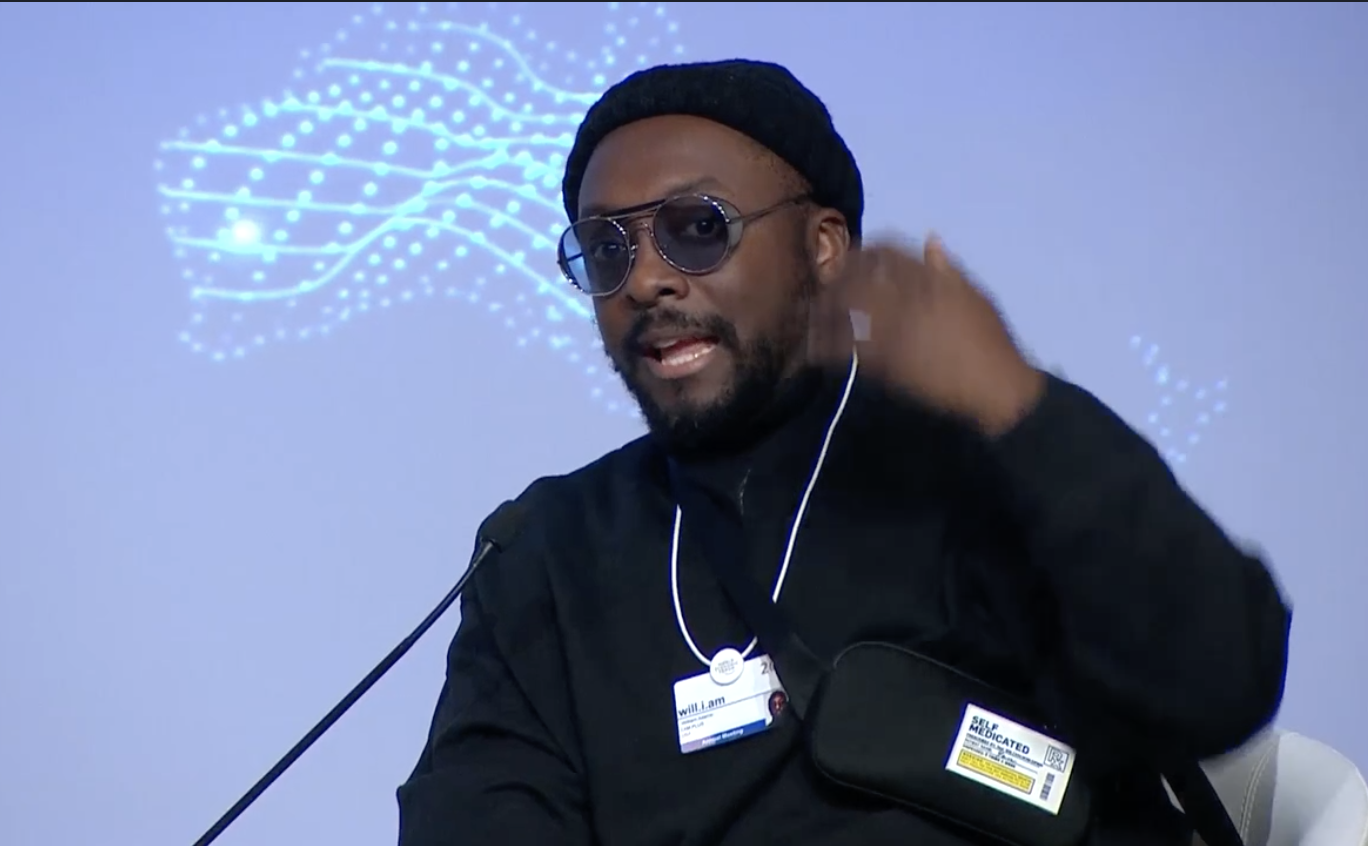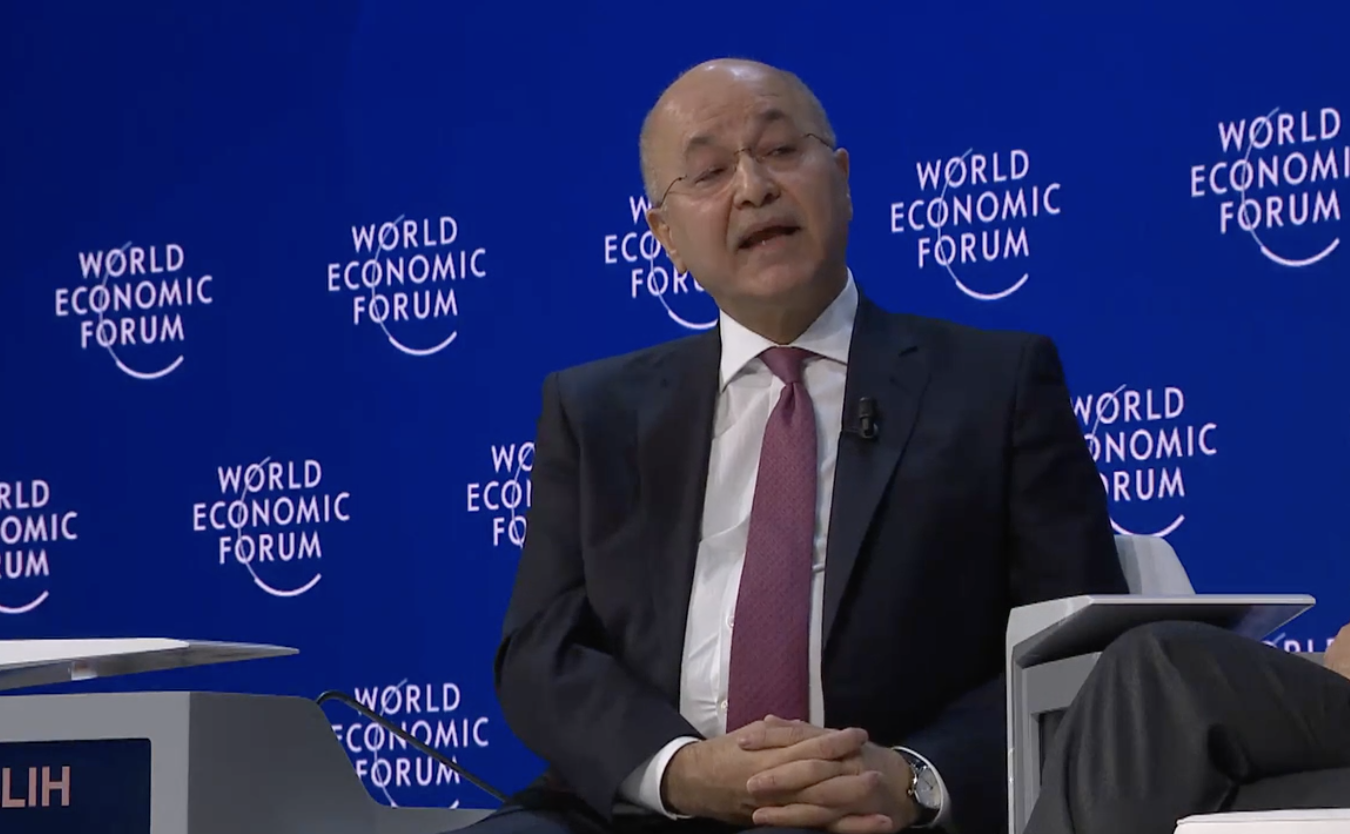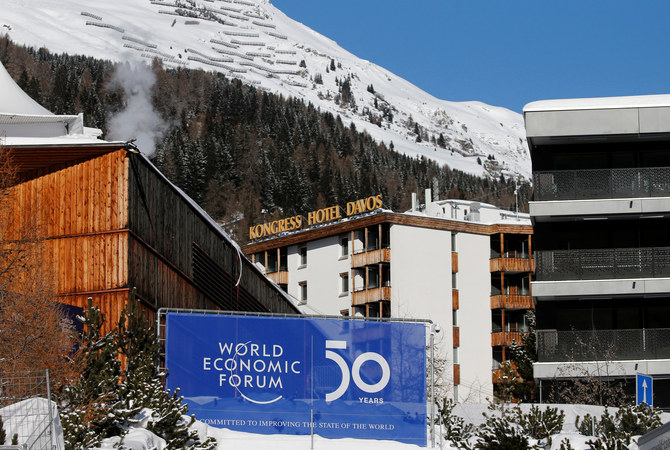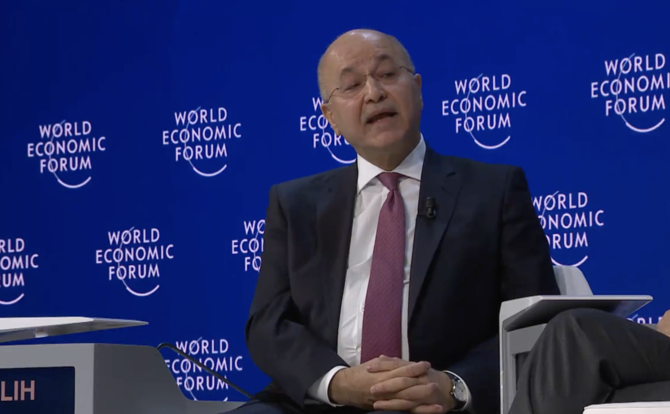DAVOS, Switzerland: The World Economic Forum 2020 continued on Wednesday from Davos in Switzerland. Foreign ministers from the Middle East and North Africa took to the stage to talk about the geopolitical outlook in the region.
There was also discussion panels on a range of topics including global financial markets, environment, science and technology.
Follow Arab News coverage here:
19:00 - That's it for Day Two, make sure you come back for another packed schedule tomorrow for Day Three. Good night...
18:15 - Superstar musician and entrepreneur will.i.am and youth activist Naomi Wadler have been talking about the fight to end gun violence — especially in the US — and how they are influencing policy change and inspiring the next generation.

17:30 - Iraq's president Barham Sali warned against pushing the country to choose sides in escalating tensions between neighboring Iran and the US. Using his address, he said a recent parliamentary vote to oust foreign forces from Iraq should not be understood as a sign of "hostility."
"The escalating tensions between Iran, the Gulf states, and the United States over the past month have reminded us that our aspirations remain subject to political disputes beyond our control and to unwelcome foreign interference," Saleh said. "It is not in our interest to choose to ally with one side at the expense of others, as long as both respect our sovereignty and independence."
He added that "no country should seek to dictate to Iraq" the nature of its relationships.

16:00 - Away from the high-profile panels and sessions at Davos, there's a whole host of interesting things on the sidelines - you can see Arab News' 'Davos Off-Piste' thread on Twitter here...
#DavosOffPiste: Here, robotic arms situated 1.5kms apart write out the same line, at the same exact time with only 5G connecting them https://t.co/IITFkjcU65 #WEF20 @Davos pic.twitter.com/T8bDsgXbo6
— Arab News (@arabnews) January 21, 2020
#DavosOffPiste: Saudi Chef Najla Al Otaibi serves up Saudi pancakes known as “Masabeb” at the Saudi Cafe on Promenade 62 af #WEF20 in @Davos https://t.co/IITFkjcU65 pic.twitter.com/sNg0AXay16
— Arab News (@arabnews) January 22, 2020
#DavosOffPiste: @MiskGlobalForum showcases Saudi artist Ahmed Angawi’s work in an exhibition titled “Possible Variations” https://t.co/IITFkjcU65 pic.twitter.com/gmBIJXeaS2
— Arab News (@arabnews) January 22, 2020
15:15 - As always, it was an impassioned speech from Pakistan's prime minister Imran Khan, who spoke about why his country is so affected by climate change, the huge untapped mineral and human potential of Pakistan - he even made reference to speaking to Trump about war between the US and Iran...
#LIVE: @ImranKhanPTI speaking at #WEF2020 - #Pakistan affected by #ClimateChange, government has ambitious plans to make the country more climate-resilient by preventing desertification and planting a billion trees #Davos2020 https://t.co/BBTrEev72r pic.twitter.com/93DKLeRfBV
— Arab News (@arabnews) January 22, 2020
#LIVE: Imran Khan at #Davos2020 says war between #Iran and #US would be a "disaster," says he spoke with Donald Trump about the issue on Tuesday - "Trump didn’t say anything in return" #WEF2020 (@wef)https://t.co/BBTrEev72r pic.twitter.com/iipd8fHnB2
— Arab News (@arabnews) January 22, 2020
14:30 - Iraqi President Barham Salih met with US President Donald Trump in Davos on Wednesday. And the two discussed reducing foreign troops in the country, the Iraqi presidency said, after Washington spurned an Iraqi request earlier this month to pull out its troops.
READ THE FULL STORY: Iraqi president Salih discusses foreign troops cut with Trump in Davos

14:15 - Missed yesterday? You can read our live blog from Day One - and you can check out the World Economic Forum's handy round-up video below...
13:50 - The UK's Prince of Wales, Charles, is giving a special address - focusing heavily on the environment and climate change and what the world can do to combat the latter's impact on the former. The prince says "we're in the middle of a climate change crisis"...
#LIVE: UK's Prince of Wales, Prince Charles tells #Davos2020 audience "we're in the middle of a climate change crisis", a "disaster of our own making" and says world needs "revolutionary change at a revolutionary pace" (@wef) #WEF2020https://t.co/BBTrEev72r pic.twitter.com/wexnYZpeCH
— Arab News (@arabnews) January 22, 2020
13:30 - Hong Kong's Chief Executive Carrie Lam used her Davos platform to say on Wednesday that the city had several crises to manage and that it was her job to remain to deal with them. You can watch a recap of her session here...

13:00 - Historic rivalries and their impact on the politics of the Middle East are in focus in a heated panel discussion...
#LIVE: Officials from the Middle East discuss historic rivalries and their effect on the regional landscapes with the President of World Economic Forum @borgebrende @davos #davos2020 #wef20
Follow our coverage of Davos here: https://t.co/ypz1zIchVo
— Arab News (@arabnews) January 22, 2020
12:45 - The Wall Street Journal Editor Thorold Baker opens a discussion on the outlook for emerging markets this year. Saudi Arabia's Minister of Economy and Planning Mohammad Al-Tuwaijri is part of the panel, and he's joined by Alicia Ibarra from the United Nations Economic Commission for Latin America and the Caribbean; Economics professor Jin Keyu; and Standard Chartered Bank chief Bill Winters.
#LIVE: “Saudi Arabia [has] been through this transformation journey for 3 and a half years now and we hope this leads to some of the emerging market solutions, ” Saudi Arabia’s Minister of Economy and Planning Mohammed Al-Tuwaijri at @Davos #Davos2020 #wef20 pic.twitter.com/RB2rBPDQCO
— Arab News (@arabnews) January 22, 2020
The Saudi minister mentioned the Kingdom's strides on "driving the non-oil growth." He emphasized the essesnce of Saudi Arabia's diversification model is to veer away from oil.
11:45 - Saudi Energy Minister Prince Abdulaziz bin Salman joins a discussion on the future of fossil fuels. Also on stage were Colombian Minister of Energy Maria Fernanda Suarez, President and Group Chief Executive Officer of PETRONAS Wan Zulkiflee Wan Ariffin, and Total chief Patrick Pouyanne.
Prince Abdulaziz reiterated the Kingdom's commitment to developing renewable energy, saying Saudi Arabia is involved in a "transfromative effort."

The officials talked about supply and demand of the oil market. (Screengrab/World Economic Forum)
11:00 - Alphabet Inc. and Google CEO Sundar Pichai takes to the stage to talk about Artificial Intelligence and its impacts on society
#LIVE: @WEF's Klaus Schwab discusses quantum computing, artificial intelligence and the future of technology governance with the @Google and Alphabet chief @sundarpichai at #davos2020 #wef20 @davos
Follow our coverage here: https://t.co/ypz1zIchVo pic.twitter.com/aZHZZB0d6f
— Arab News (@arabnews) January 22, 2020
10:00 - World Economic Forum President Borge Brende is moderating a panel discussion on the Middle East and North Africa. He is joined Turkey's Minister of Foreign Affairs Mevlut Cavusoglu, his Omani counterpart Yousuf Bin Alawi Bin Abdullah, Prime Minister of Jordan Omar Al Razzaz, and Jane Harman, the president of the Woodrow Wilson International Center for Scholars.
Jordan's Razzaz said the world has "to be very careful about the sorts of intervention, regional and global, that we do."
He added: "Jordan… has presented a model, that shows political and economic resilience."
#LIVE: “[We should] ask ourselves, how we want to see ourselves in the Middle East in the coming 50-60 years… we should think about the future,” Oman’s Minister of Foreign Affairs Yousuf Bin Alawi Bin Abdullah (@MofaOman) at #Davos2020 @davos #wef20 pic.twitter.com/sRXze1aW3J
— Arab News (@arabnews) January 22, 2020



















